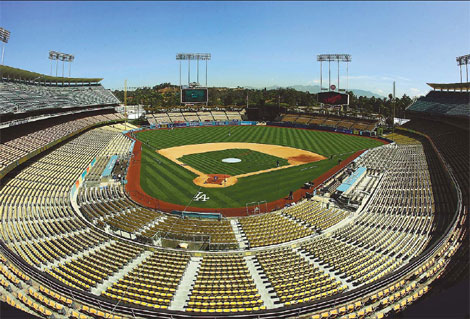Center
Can China buy America's game?
Updated: 2011-09-25 07:59
By Dusty Lane (China Daily)
 |
|
Dodgers Stadium in Los Angeles has historically boasted one of the highest attendance averages in MLB, but the numbers have dropped significantly even as the franchise is already struggling with insolvency. A Los Angeles Times report earlier this month said a group of investors backed by the Chinese governement offered to buy the team for $1.2 billion. [Photo/Agencies] |
Baseball = marketing tool
The hue and cry come as no surprise to Darrell Hamamoto, Professor of Asian American Studies at the University of California, Davis.
Hamamoto said Cold War fears in the US still run strong, especially among the older generation.
"The Seattle Mariners scenario of several years ago took place at the early stage of the US de-industrialized American economy and as racially loaded as the controversy was - shades of another "sneak attack" by Nippon, this time via the economy - it would be nothing compared to the backlash if the PRC tried to buy into American professional baseball," he said.
"Japan in the post-war period is a chief ally of the US, whereas with China, there's a fear of the so-called red Chinese enemy. I don't know what China can do to make (such an offer) more palatable."
Would such an offer be more palatable if it were a private Chinese citizen, rather than the government, backing it?
Baseball is aggressively pursuing marketing and development opportunities in China - earlier this month, it opened its second Chinese development center, in Changzhou, Jiangsu province. Most teams have scouts working the area.
Ultimately, the decision would come down to a vote of the owners - three-quarters must vote yes to approve a sale. There's no language in MLB's constitution dictating the composition of an ownership.
But does MLB's interest in China consist solely of bull's eyes centered on tapping into a massive market and an ocean of untapped talent?
A major investment is not unprecedented on the global stage.
In 2009, Chinese-born investor Kenny Huang led a group that bought 15 percent of the NBA's Cleveland Cavaliers.
Also that year, Hong Kong's Carson Yeung - after a protracted battle - purchased Premier League soccer's Birmingham City FC.
He has said other Chinese owners are eyeing teams.
With its status as America's pastime, though, baseball might be a tougher peanut to crack.
"Baseball as a marketing tool is now synonymous with American nationalism," Hamamoto said.
E-paper

Pearl paradise
Dreams of a 'crazy' man turned out to be a real pearler for city
Literary beacon
Venice of china
Up to the mark
Specials

Power of profit
Western companies can learn from management practices of firms in emerging economies

Test of character
Keyboard-dependent Chinese are returning to school because they have forgotten how to write

Foreign-friendly skies
About a year ago, 48-year-old Roy Weinberg gave up his job with US Airways, moved to Shanghai and became a captain for China's Spring Airlines.
